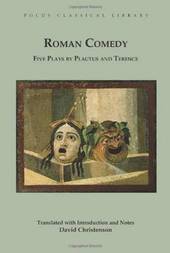
|
Roman Comedy: Five Plays by Plautus and Terence: Menaechmi, Rudens and Truculentus by Plautus; Adelphoe and Eunuchus by Terence
Paperback / softback
Main Details
| Title |
Roman Comedy: Five Plays by Plautus and Terence: Menaechmi, Rudens and Truculentus by Plautus; Adelphoe and Eunuchus by Terence
|
| Authors and Contributors |
By (author) Plautus
|
|
By (author) Terence
|
|
Edited and translated by David Christenson
|
| Series | Focus Classical Library |
|---|
| Physical Properties |
| Format:Paperback / softback | | Pages:348 | | Dimensions(mm): Height 229,Width 153 |
|
| Category/Genre | Plays, playscripts
Literary studies - classical, early and medieval |
|---|
| ISBN/Barcode |
9781585103195
|
| Audience | |
|---|
| Illustrations |
none
|
|
Publishing Details |
| Publisher |
Focus Publishing/R Pullins & Co
|
| Imprint |
Focus Publishing/R Pullins & Co
|
| Publication Date |
1 January 2010 |
| Publication Country |
United States
|
Description
This anthology contains English translations of five plays by two of the best practitioners of Roman comedy, Plautus and Terence. The plays, Menaechmi, Rudens, Truculentus, Adelphoe, and Eunuchus, provide an introduction to the world of Roman comedy. As with all Focus translations, the emphasis is on a handsomely produced, inexpensive, readable edition that is close to the original, with an extensive introduction, notes and appendices.
Author Biography
David Christenson (Ph.D. Harvard Uniserisy) is Associate Professor of Classics at the University of Arizona. He is the author of several books including "Roman Comedy: Five Plays by Plautus and Terence" and "Plautus: Casina, Amphitryon, Captivi, Pseudolus," both for Focus Publishing. In 2011-12, he will be a Loeb Classical Library Foundation Fellow.
Reviews...Christenson's translations ... Are lucid and engaging. Perusal of this volume will give students and the general audience alike a cogent sense of Terence's elegance, and frequent glimpses into the wild wordplay of Plautus... In this volume, Christenson offers teachers of Roman literature an excellent collection of approachable, enjoyable versions of key works the corpus of the comoedia palliata. The text is clean and mostly typo-free, and the book is both well-manufactured and eminently affordable. With its introduction and commentary that connect the plays to other authors, cultural context, and wider socio-historical developments, this book will serve well as a staple for classes ranging from surveys of Roman civilization and Western literature to courses on ancient humor and the history of theater, independently or in combination with Christenson's prior collection. Reviewed by T. H. M. Gellar-Goad, University of North Carolina at Chapel Hill Bryn Mawr Classical Review 2010.11.16
|